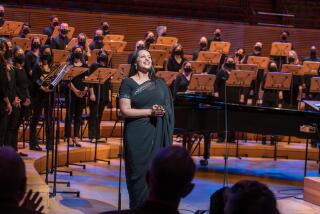Facing the World’s Identity Crises
- Share via
Thanks to the singing of Bulgarian women’s choirs, more and more people know the qualities of the music of the Balkans:
* Its close and plangent harmonies.
* Its soaring and haunting melodies.
You’ll hear echoes of that in Neil B. Rolnick’s “Requiem Songs--For the Victims of Nationalism” in a free concert at 8 p.m. Wednesday in Winifred Smith Hall at UC Irvine.
But there are some differences:
* The singing is in English.
* Electronic distortions begin to create feelings of dread or fear.
Though based at a prestigious university, Rolnick is no ivory tower composer.
A sabbatical in Yugoslavia in 1993, for instance, led him to write this frankly political work.
“It was clear even then that something serious was going to happen,” Rolnick, 52, said by phone recently on his way to Rensselaer Polytechnic Institute in Troy, N.Y., where he is chairman of the arts department and director of the iEAR Studios.
“The last meal I had in Belgrade was with two composers at the conservatory. They were talking about getting guns to defend themselves from the Croats.”
Though his nine “Requiem Songs” draw on folk material, he has changed the lyrics so that new meanings emerge.
“Political music is not necessarily effective,” the composer said. “But you represent your thoughts the best way you can, and who knows what really has an effect?
“There’s something really complicated about this problem of nationalism,” he continued.
“In the Balkans, the music is very distinctive, and it’s distinctive by village, by nation--as they call states--and there is a real richness in that kind of identity.
“At the same time, the identity gets pushed to a level where if you’re not part of one thing, you should be killed. You’re not the right stuff. There’s some craziness there.”
The problem isn’t restricted to the Balkans, he said.
“When I was 18, I bummed around the British Isles, [listening to] folk songs. I remember being in a pub in Ireland and hearing all these anti-British songs, thinking they were keen.
“Then I realized they were talking about killing people because they were British. This is not so cute anymore. That’s where all this comes from.”
“You certainly wouldn’t want to deny people’s identities in terms of where they come from and what their heritage is,” he added, “but somehow it gets pushed to the point where it’s really destructive and evil.”
Rolnick, born in Dallas in 1947, studied literature at Harvard (B.A., 1969) but switched to music, studying composition at the Aspen Music School, San Francisco Conservatory and UC Berkeley (PhD, 1980).
His work from the late ‘80s showed “a move in the direction of thinking much less like an academic composer,” he said, toward “always thinking, ‘What’s the work about? What do I really want to say here? What’s the best way to get that context across?’ Not worrying whether it meets some preconceptions of what I should be doing or anyone else should be doing.”
His academic colleagues have not exactly endorsed this move.
“I’ve felt less and less included in the kinds of organizations that were important to me earlier in my career,” Rolnick said. “I felt less interested in what they’re doing and they’ve shown an equal reaction in what I’m doing, which is only fair.”
But he’s continued to move in this popular direction, working for the past several years on a Broadway-type musical, “The Rise and Fall of Isabella Rico,” with Larry Beinhart (author of “American Hero,” on which the film “Wag the Dog” is based).
“It’s fascinating to work in this milieu which is so different from the traditional classical music environment,” Rolnick said. “If you’re the composer, you’re god in classical music. Everyone is responsible to do whatever you say is right. In the theater, the audience is god.”
* Neil Rolnick will conduct his “Requiem Songs--for the Victims of Nationalism” at 8 p.m. Wednesday in the Winifred Smith Hall (formerly, the UCI Concert Hall), corner of West Peltason Drive and Mesa Road, UC Irvine. Free. (949) 824-2787.
Chris Pasles can be reached at (714) 966-5602 or by e-mail at chris.pasles@latimes.com.
More to Read
The biggest entertainment stories
Get our big stories about Hollywood, film, television, music, arts, culture and more right in your inbox as soon as they publish.
You may occasionally receive promotional content from the Los Angeles Times.










